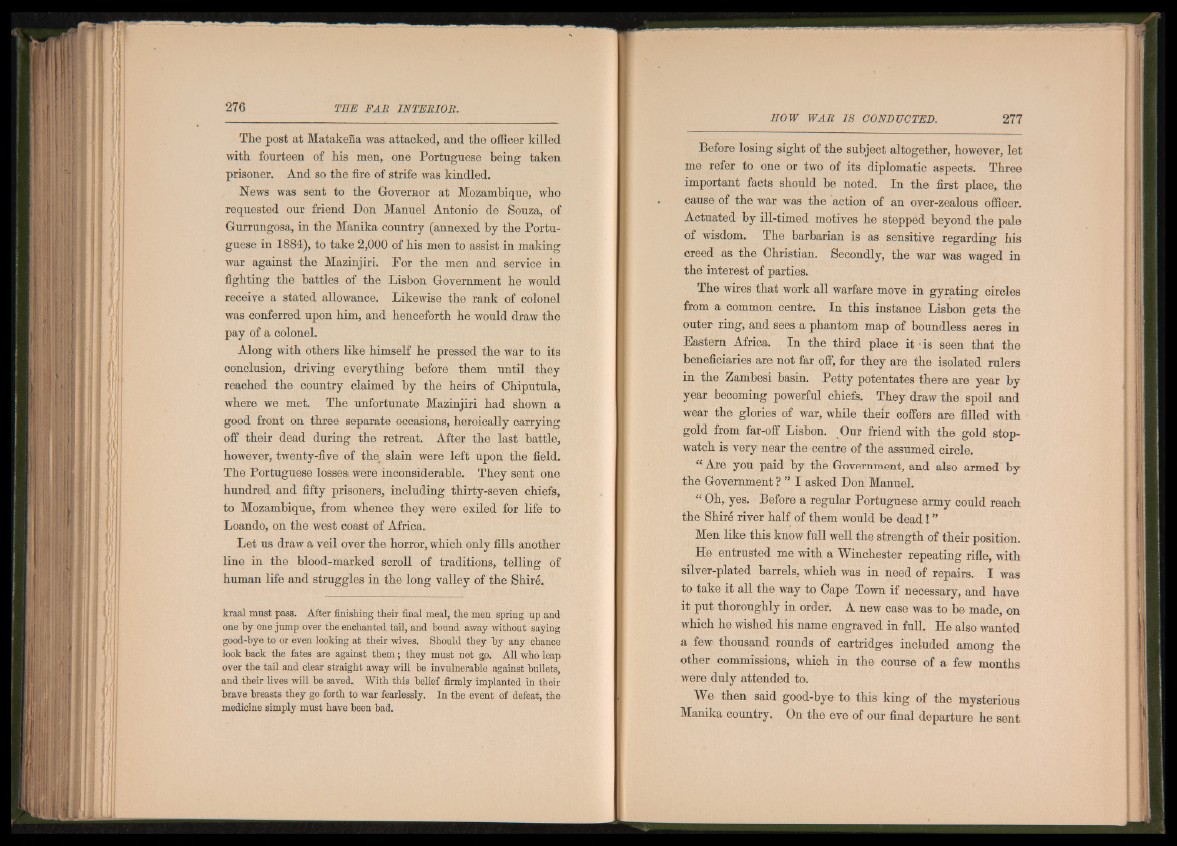
The post at Matakena was attacked, and the officer killed
with fourteen of his men, one Portuguese being taken
prisoner. And so the fire of strife was kindled.
News was sent to the Governor at Mozambique, who
requested our friend Don Manuel Antonio de Souza, of
Gurrungosa, in the Manika country (annexed by the Portuguese
in 1884), to take 2,000 of his men to assist in making
war against the Mazinjiri. For the men and service in
fighting the battles of the Lisbon Government he would
receive a stated allowance. Likewise the rank of colonel
was conferred upon him, and henceforth he would draw the
pay of a colonel.
Along with others like himself he pressed the war to its
conclusion, driving everything before them until they
reached the country claimed by the heirs of Chiputula,
where we met. The unfortunate Mazinjiri had shown a
good front on three separate occasions, heroically carrying
off their dead during the retreat. After the last battle,
however, twenty-five of the slain were left upon the field.
The Portuguese lossesi were inconsiderable. They sent one
hundred and fifty prisoners, including thirty-seven chiefs,
to Mozambique, from whence they were exiled for life to
Loando, on the west coast of Africa.
Let us draw a veil over the horror, which only fills another
line in the blood-marked scroll of traditions, telling of
human life and struggles in the long valley of the Shire.
kraal must pass. After finishing their final meal, the men spring up and
one by one jump over the enchanted tail, and bound away without saying
good-bye to or even looking at their wives. Should they by any chance
look back the fates are against them; they must not go. All who leap
over the tail and clear straight away will be invulnerable against bullets,
and their lives will be saved. With this belief firmly implanted in their
brave breasts they go forth to war fearlessly. In the event of defeat, the
medicine simply must have been bad.
Before losing sight of the subject altogether, however, let
me refer to one or two of its diplomatic aspects. Three
important facts should be noted. In the first place, the
cause of the war was the action of an over-zealous officer.
Actuated by ill-timed motives he steppéd beyond the pale
of wisdom. The barbarian is as sensitive regarding his
creed as the Christian. Secondly, the war was waged in
the interest of parties.
The wires that work all warfare move in gyrating circles
from a common centre. In this instance Lisbon gets the
outer ring, and sees a phantom map of boundless acres in
Eastern Africa. In the third place it -is seen that the
beneficiaries are not far off, for they are the isolated rulers
in the Zambesi basin. Petty potentates there are year by
year becoming powerful chiefs. They draw the spoil and
wear the glories of war, while their coffers are filled with
gold from far-off Lisbon. Our friend with the gold stopwatch
is very near the centre of the assumed circle.
“ Are you paid by the Government, and also armed by
the Government ? ” I asked Don Manuel.
“ Oh, yes. Before a regular Portuguese army could reach
the Shiré river half of them would be dead! ”
Men like this know full well the strength of their position.
He entrusted me with a Winchester repeating rifle, with
silver-plated barrels, which was in need of repairs. I was
to take it all the way to Cape Town if necessary, and have
it put thoroughly in order. A new case was to be made, on
which he wished his name engraved in full. He also wanted
a few thousand rounds of cartridges included among the
other commissions, which in the course of a few months
were duly attended to.
We then said good-bye to this king of the mysterious
Manika country. On the eve of our final departure he sent